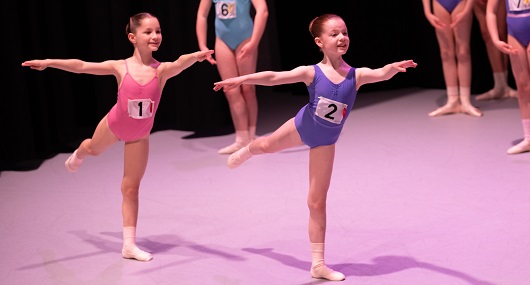7 January 2021
Tereza Theodoulou, Modern Theatre and Tap Dance Senior Examiner and Theatre Faculties’ International Ambassador, talks female leaders in dance.
When I was first asked to share some thoughts on being a female leader in dance, I was flattered. I then realised there would be a great temptation to sound like you are advertising yourself as a motivational speaker. In all honesty, the greatest attribute to ‘leading’ is not to think of yourself as a leader per se, but to cultivate the ability to always look for a positive spin on whatever adversities come your way.
My top tips
Rather than give you a timeline of my own achievements, I’d like to share some of the core principles that I have strived to employ throughout my career. These key themes have ultimately driven me as a dancer, teacher, choreographer, examiner, lecturer, company director, principal of my own school, and co-founder of my own Musical Theatre company.
- Knowledge is power
Look for commonality in everything you are tasked with and cross-transfer your knowledge and skills. Simply put, the technique learnt in ballet regarding muscle activation, extension and mobilisation are valid for Jazz, Modern Theatre and Contemporary. - Think laterally
Develop the above concept to utilise your skills. The energy spent learning how to plan a class, evaluate and set future goals will hold you in good stead when planning a show, creating choreography, developing a syllabus, presenting a business plan, or running your own company. - Be adaptable
Have an open mind – always question everything and if the answers don’t satisfy you ask someone else. If you’re still not satisfied, ask a different question. Use the answers to develop new understandings. - Set attainable goals
If you hit a stumbling block along the way, look for different pathways or new solutions. If your goals change, embrace the new challenge as an opportunity to grow and diversify. Set reasonable goals to drive and motivate you. If the goals are beyond your reach, this could result in disappointment. - Retain and develop your passion
Never lose sight of what has inspired you and try to ignite the same passion in others. Share your knowledge and recognise peoples’ achievements. Remember, enthusiasm is contagious! - Be inquisitive and search for resolutions
Give appropriate praise when it’s due and address failure as a task that needs to be resolved. Continue to ask yourself:
- Why something went wrong
- What you could learn from an experience
- What you would change or do differently if faced with the same situation again
- How you can turn a set of circumstances to your advantage. - Stay up to date
Keep an eye on the future and be aware of current affairs. Be inquisitive. Find out about the latest teaching methodologies and theories of physical development. Actively research the most up to date information about Dance Science. Go to the theatre, visit art galleries and museums, and attend courses – all can be accessed online now so take advantage of newly available technology. - Never stop learning
Make the internet your friend. If you can’t access it yourself, then ask someone to show you. Never be afraid to admit you don’t know the answers but also work to develop your knowledge further. Get excited about continually educating yourself and find new ways of doing things. How can you lead others if you haven’t explored a variety of paths and destinations yourself? - Cultivate an interest in people
Take time to ask questions. Find out what excites your students, teachers, employees, or clients. Ask what scares them. Make time to listen and remember what you’ve heard. Have empathy. Be patient. Always look for the good in others and go out of your way to nurture all that can flourish with encouragement. - Mentor and Mentee
Respond to others that are seeking help and work together to set a plan of action. When you recognise an area of expertise you wish to develop, approach others to mentor you.
I have tried to live by these basic principles in various forms periodically throughout my life.
Strong inspirational women in my life
I have encountered many brilliant women throughout my life. The strongest woman I have ever known was my mother. Although she was not a dancer, she led my family through a series of tragedies and triumphs that have shaped my very existence. My first dance teacher, Joy Spriggs, ignited my passion for dance.
Other inspirational figures in my life include:
Daphne Peterson
Daphne Peterson, a dear teacher who was pivotal in the creation of previous modern vocational syllabi and mentor of many West End and Broadway dancers, choreographers and examiners, taught me how to cultivate the best out of people while retaining the joy and purpose of dance.
Doreen Bird MA FISTD ARAD
Doreen Bird, also taught by the brilliant Daphne Peterson, guided, mentored, and led by exquisite example, helping shape me as a teacher and creator. While still a young teacher at Bird College, I presented her with a problem I could see developing. Her response was kind, respectful and as always, an opportunity for her to teach, nurture and encourage me to hone skills that I continue to use today.
She said it was not part of her role as Principal to solve problems. I was told to identify the problem and to come up with three possible solutions. Once I had completed the task, I had to request a meeting with her in which we would discuss each option and decide which was worth pursuing. I then had to write a proposal that could be put in place to resolve the existing issue, which could also be used to prevent the situation from recurring.
Giving me the task to consider options, look at a situation from various perspectives and put forward a plan of action was frightening at first. But I quickly understood that as Principal, Doreen’s role was to recognise potential in others and to nurture it. Over the years I have endeavoured to do the same, and learnt that giving people responsibility through delegation is two-fold. It gives you the freedom to get on with other tasks while developing confidence and trust in those who have been given responsibility.
Final words of advice
My last piece of advice would be to never allow yourself to become complacent. Standard Dictionary definitions define ‘complacency’ as: “uncritically satisfied with oneself or one’s achievements”. Complacency can often lead to apathy.
One should certainly recognise and celebrate one’s successes, but at the same time strive to continue to build on these triumphs so you might reach your own potential and be an inspiration to those around you.










